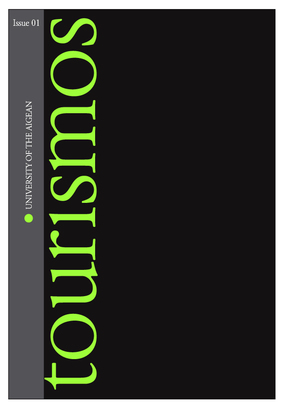Analysis of “all-Inclusive” tourism mode in the balearic islands
Part of : Tourismos : an international multidiciplinary journal of tourism ; Vol.7, No.1, 2012, pages 309-323
Issue:
Pages:
309-323
Section Title:
Case studies
Author:
Abstract:
Tourism market forces in most tourism driven economies and mature tourism destinations shift from the ‘conventional independent’ to ‘all-inclusive’ (AI) tour mode. Using Majorca as a case study, this paper analyses the AI mode: its supply and demand sides. Through specific tourist and desk surveys conducted in 2006, it was revealed that until May 2006,the population of AI accommodation suppliers in Majorca was around 195; 36% of which offer ‘exclusively AI’ product. Moreover, above 85% of tourists visiting Majorca were package tour customers; with at least 15 percent travelling through the AI tours. Noticeably, an AI tourist spends less than overall average tourist’s expenditure per day at the destination, but spends more at the country of origin. Challenges are identified and recommendations given to improve the welfare of the economy.
Subject (LC):
Keywords:
all-inclusive demand and supply, Balearic Islands, Majorca
Notes:
Περιέχει σχήματα, πίνακες και βιβλιογραφία
References (1):
- Abdool, A. & Carey, B. (2004). Making All-inclusive More Inclusive. A Research Project on the Economic Impact of the AI Hotel Sector in Tobago for the Travel Foundation. Alegre, J. & Pou, L. (2006). El Paquete Turístico de Todo Incluido: Un análisis de sus implicaciones económicas para el caso de las Islas Baleares. Anderson, W. (2008). Analysis of AI Travel Mode: Demand and Supply Perspectives in the Balearic Islands. Unpublished PhD Thesis. University of the Balearic Islands, Palma de Mallorca. Anderson, W. (2009). Promoting Ecotourism through Networks: Case Studies in the Balearic Islands. Journal of Ecotourism. Vol. 8, No.1, pp.51-69. Anderson, W., Juaneda, C. & Sastre, F. (2009). Influences of pro- AI travel decisions. Tourism Review, Vol. 64, No.2, pp.4-18. Botti, L., Peypoch, N., Randriamboarison, R. & Solonandrasana, B. (2007). An Econometric Model of Tourism Demand in France. Tourismos: An Wineaster Anderson 322 International Multidisciplinary Journal of Tourism, Vol. 2, No.1, pp.11-29. Claveria, O. & Datzira, J. (2009). Tourism Demand in Catalonia: Detecting External Economic Factors. Tourismos: An International Multidisciplinary Journal of Tourism, Vol. 4, No.1, pp.13-28. Comissió Experts “tot inclos”. (Desembre 2005). “Conclusions de l’informe elaborat per la comissio d’experts per a l’estud i el seguiment del TOT” Informe final. Conselleria de Turisme. (2005). “El Turisme a les Illes Balears: Dades Informatives”, Conselleria de Turisme, Palma. Conselleria de Turisme, Govern de les Illes Balears. (2006a). Anàlisis del tot inclòs. Conselleria de Turisme, Govern de les Illes Balears. (2006b). Establiments Exclusius de TOT INCLOS 2006. Diari de Balears (Dimarts, 23 de Maig del 2006). Les arribades de turistes alemanys i britanics caucen el primer cuadrimestre, pp. 3. El Mundo/El día de Baleares (23 de Mayo de 2006). 162 hoteles de Baleares ofertaran ‘todo incluido’, 19 menos que en 2005, pp.17. Holloway, C. (1998). The Business of Tourism, 5th ed. Addison Wesley Longman Ltd., Singapore. Holloway, J. (2000). Tour. In J. Jafari (Eds.) The Encyclopedia of Tourism (pp.582-583), London: Routledge,. Hoti, S., Mcaleer, M. & Sansó, A. (2005). Specialization, Diversification and Segmentation of British and German Tourists to the Balearic Islands, Proceedings of the 2005 International Conference on Simulation and Modeling V. Kachitvichyanakul, U. Purintrapiban, and P. Uthayopas, Eds. Instituto de Estudios Turísticos. (2004). Movimientos Turísticos en Fronteras (Frontur). Instituto Nacional de Estadística (2006). ‘Encuesta de Ocupación hotelera 2004’, Servicio-Hostelera y Turismo. Issa, J. & Jayawardena, C. (2003). The 'AI' Concept In The Caribbean. International Journal Of Contemporary Hospitality Management, Vol. 15, No.3, pp.167-171. Middleton, V. (1994). Marketing in travel and tourism, 2nd ed. Oxford, Butterworth Heinemann. Millington, K., Locke, T. & Locke, A. (2001). The AI Market. Travel & Tourism Intelligence. London, Mintel International Group. Morrison, A. (1989). Hospitality & Tourism Marketing. New York, Delmar Publishers. Paris, J. & Zona-Paris, C. (1999). 100 Best AI Resorts of the World. The Globe Pequot Press, Guilford, CT. Parrilla, J., Riera, A. & Nada, J. (2006). Specializing in Tourism and Long-term Growth: Evidence from the Balearic and the Canary Islands, Documents de treball 2006/3. Sheldon, P. & Mak, J. (1987). The demand for package tours: A mode choice model. Journal of Travel Research, Vol. 25, No.3, pp.13-17.TOURISMOS: AN INTERNATIONAL MULTIDISCIPLINARY JOURNAL OF TOURISM Volume 7, Number 1, Spring-Summer 2012, pp. 309-323 UDC: 338.48+640(050) 323 Tourism Intelligence International. (2005). How the British Will Travel 2005. Tourism Intelligence International, Bielefeld. Ultima Newspaper (23 de Mayo de 2006). Flaquer afirma que este verano hay 19 hoteles menos con ‘todo incluido’ en Majorca: Turismo y sanitas inician una campaña de inspección sobre esta oferta de alojamiento, pp. 18 . Wong, S. & Lau, E. (2001). Understanding the behaviour of Hong Kong Chinese tourists on group tour packages. Journal of Travel Research, Vol. 40, No.1, pp.57-67.




